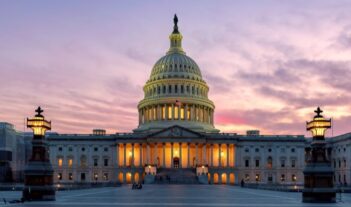
The Supreme Court grants district-court jurisdiction in an opinion hampering agencies’ adjudicatory authority.
Adjudication by federal regulatory agencies has come under more intense constitutional scrutiny today than at any time since the New Deal. That scrutiny reached a new level recently when the U.S. Supreme Court agreed to hear a much-watched case—SEC v. Jarkesy—in which a litigant has challenged Congress’s constitutional authority to assign the adjudication of securities fraud claims for civil penalties to the U.S. Securities and Exchange Commission (SEC) rather than a federal court. The lower court held that Congress may not do so constitutionally. Constitutional challenges to adjudication at other agencies on these and other so-called structural grounds are already pending before the lower courts. They, too, will likely reach the Supreme Court.
Toward the end of its 2022 term, the Court decided two cases—consolidated under the name Axon v. FTC—that did not address the merits of these or any other challenges to administrative adjudication, but did resolve important threshold procedural questions about where and when constitutional claims over agency adjudication can be litigated.
Axon arose from two administrative enforcement proceedings already pending (not merely threatened)—one before the Federal Trade Commission (FTC) for antitrust law violations, the other before the SEC for securities fraud. The private parties targeted by the agencies’ enforcement actions sued in federal district court to enjoin the proceedings as unconstitutional. Both claimed that the statutory protection against for-cause removal for ALJs violates the separation of powers by unduly limiting the President’s constitutional duty to supervise them. The challenger in the FTC suit also raised a more “fundamental” argument against a judicially irremediable feature of nearly all agency adjudication: Prosecution and adjudication are combined in the same agency—albeit, under the Administrative Procedure Act (APA), with some separation of staff functions.
The only question in these cases centered on whether the district court had jurisdiction to consider the plaintiffs’ claims.
Answering that question requires interpreting two jurisdictional statutes. The general federal jurisdictional statute—section 1331 of title 28 of the U.S. Code—gives district courts the authority to hear any civil actions arising under federal law. At the same time, a “special” or agency-specific statute allows court of appeals, rather than the lower district courts, to directly review final FTC decisions and another such statute to review final SEC decisions directly. Did these special review statutes provide an “exclusive scheme of review” that precludes a district court from exercising section 1331 jurisdiction over the plaintiffs’ constitutional claims?
This technical jurisdictional question has important implications. If a special review statute precludes district court jurisdiction, a plaintiff like the plaintiffs in Axon will have the opportunity to bring its constitutional challenge before a federal court, but it will typically be before a court of appeals and, more importantly, only after the agency issues a final adjudicative decision. The plaintiff will need to defend itself before the agency on the merits of the agency’s claims, unless it chooses—as few plaintiffs will do—to stand on only its constitutional defenses. Litigation expenses and uncertainty about the outcome will often lead the plaintiff to settle with the agency, thereby leaving the plaintiff’s constitutional defenses unaddressed.
If, on the other hand, the agency’s special review statutes do not preclude district court jurisdiction, then the plaintiff may proceed directly with its constitutional challenge in a district court without awaiting conclusion of agency proceedings. The plaintiff will ask the district court to enjoin—at first preliminarily in most cases—the agency proceedings.
A unanimous Supreme Court concluded that the special review statutes did not preclude district court jurisdiction over the plaintiffs’ claims. Justice Kagan wrote the opinion for the Court, which was joined by all but Justice Gorsuch, who concurred in the judgment but urged a different interpretive approach.
The Court relied on the test established in 1994 in Thunder Basin Coal Co. v. Reich for identifying claims that Congress would not have “intended” a special statutory review scheme to cover. That test asks three questions: (1) Would “precluding district court review ‘foreclose all meaningful judicial review’ of the claim?” (2) Is the “claim ‘wholly collateral to the statute’s review provisions’?” and (3) “Is the claim ‘outside the agency’s expertise’?” The Court answered “yes” to each question.
As for the first question, the plaintiffs’ claimed injury was “being subjected” to an unconstitutional proceeding. That injury would be irremediable “once the proceeding is over”—whether the plaintiff won before the agency or lost there but won before a reviewing court on its claim that the proceeding was unconstitutional. Judicial invalidation of an adverse agency decision would not “undo” the plaintiffs’ injury. “Meaningful judicial review” could only be provided in a district-court suit in which the agency proceeding, if unconstitutional, could be stopped by an injunction.
The Court’s answer to the second question largely followed from its answer to the first: The plaintiffs challenged the agency’s “power generally, not anything particular about” how the agency might wield it—not, say, whether some procedural rule violated due process. The Court distinguished Constitutional challenges to “commonplace” adjudicative procedures, which must await court of appeals review of a final agency decision.
The third question was the most easily answered: Neither the FTC nor the SEC had any special expertise in resolving structural constitutional issues.
As a doctrinal matter, this holding was predictable and unremarkable—consistent with, if not compelled by, precedent and carefully limited in its scope. Axon is nonetheless an important development in the ongoing challenge to agency adjudication for several reasons.
First, it will almost certainly encourage more regulated firms to litigate constitutional challenges to agency adjudicative proceedings rather than forgoing them by settling those proceedings. Second, it may lead agencies to choose federal court enforcement to administrative enforcement when a statute gives that option, as does the SEC’s. Some agencies appear already to be headed in that direction. Finally, it will likely hasten the arrival of what may be unprecedented Article III challenges to Congress’s assignment of regulatory claims to agencies for adjudication.
Several Justices are undoubtedly awaiting those challenges. Among them are Justice Thomas, who even used a concurring opinion in Axon as an occasion to express his “grave doubts” about the constitutional authority of agencies—without plenary federal court review—to adjudicate claims involving the deprivation of private property. I commend readers to Justice Thomas’s opinion for its lucid, although surely contestable, preview of the argument likely to arrive at the Court soon in Jarkesy and then in other cases that will likely follow.
This essay is one of a nine-part series entitled The Supreme Court’s 2022-2023 Regulatory Term.




